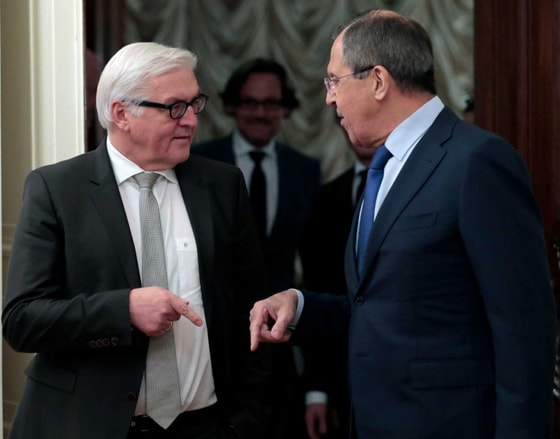German Foreign Minister goes to Russia: A multi-purpose trip
(Baonghean) - In the context of the escalating violence in Eastern Ukraine, German Foreign Minister Frank-Walter Steinmeier paid a two-day visit to Russia (November 18 and 19). This diplomatic move by Germany not only shows the flexibility of Europe - with Germany's leading role - in reducing the endless tensions over the crisis in Ukraine.
 |
| German Foreign Minister Frank-Walter Steinmeier (left) meets with Russia's Foreign Minister Sergey Lavrov. |
Affirming the purpose of the first visit by a senior German government official since the crisis in Ukraine broke out earlier this year, German Foreign Minister Frank-Walter Steinmeier said that Germany hopes that the contacts between Russian President Vladimir Putin and world leaders at the recent G-20 Summit in Australia will create a more favorable atmosphere for the parties to negotiate a long-term ceasefire agreement in Eastern Ukraine. That is the purpose, but the reactions from Russia to the visit do not seem to bring any optimistic signals in response to Germany's goodwill. Ahead of the visit to Moscow by his German counterpart, Russian Foreign Minister Sergei Lavrov said that this is a normal working trip and the parties should not expect a breakthrough in settling the Ukraine crisis.
It seems that the Russian side's reactions before the German Foreign Minister's visit have more or less shown the results of this trip. Speaking at a press conference after talks with his Russian counterpart Sergei Lavrov on November 18, German Foreign Minister Frank-Walter Steinmeier, although declaring that the issue of separating the warring parties in Eastern Ukraine is about to find a solution, also emphasized that the two sides still need to discuss more.
It can be seen that Russia's reaction is completely within public opinion's predictions. But why is this trip still attracting attention despite the predicted outcome? Many analysts believe that Russia's recent attitude is most likely the answer to this question. Evidence of Russia's tough stance is most clearly demonstrated by Russian President Putin's action of "leaving early" at the recent G20 Summit in Brisbane, Australia. This action has even been warned by analysts of an unfavorable trend in the relationship between Russia and the West in the coming time. Not only that, before that, there were also the most obvious "damages" in Russia's diplomatic relations with the West.
On November 17, Russia expelled several Polish diplomats, in connection with Poland's actions deemed "unfriendly", "unfriendly" or "unfounded" in its treatment of Russia in recent times. Previously, Poland had expelled several Russian diplomats on charges of "espionage". The expulsion of diplomats also occurred between Russia and Germany. On November 16, the German Foreign Ministry announced that a German diplomat was also expelled by Russia. From these events, it can be seen that the attitudes and sanctions of Western countries towards Russia are not only failing to "cool down" the conflict in Ukraine but are also pushing diplomatic tensions to an uncontrollable level. This has also made analysts suspicious of the possibility of a cold war returning to Europe.
Perhaps that is why Germany – which is considered to have an important role in reconciling Russia and the West – is trying to play its part. This is completely understandable. As the diplomatic crisis between Europe and Russia in general, and between Germany and Russia in particular, deepens, of course, the opportunity for negotiations will become much more difficult. Without flexible moves, it is likely that Germany will find it much more difficult to take on a pioneering role in the West’s plan to resolve the Ukraine crisis. And this also means that not only Russia-West relations but also Russia-Germany relations will decline.
Looking at the Russia-Germany relationship, it can be seen that the relationship between the two countries is quite close. Over the years, Germany has always strived to establish a sustainable security partnership with Russia, supporting economic, financial and cultural cooperation with Russia on both bilateral and multilateral levels. Chancellor Merkel has a very close personal relationship with President Putin. Looking more specifically at the economic aspect, the increasing tension between Russia and the EU will also cause damage to the leading economy, Germany. In a new statement, Russian President Putin warned Germany that 300,000 jobs in the country will face risks without contracts with Russia. Therefore, it is understandable why Germany always tries to assert its role in reconciliation with the West as well as Russia.
In the context of the continued tension between Russia and the West in general, and between Russia and Germany in particular, especially after Russia expelled German diplomats, this trip has partly shown the "flexibility" in Germany's policy towards Russia. According to analysts, this trip, regardless of the outcome, has demonstrated Germany's common and individual goals.
Thanh Hien






